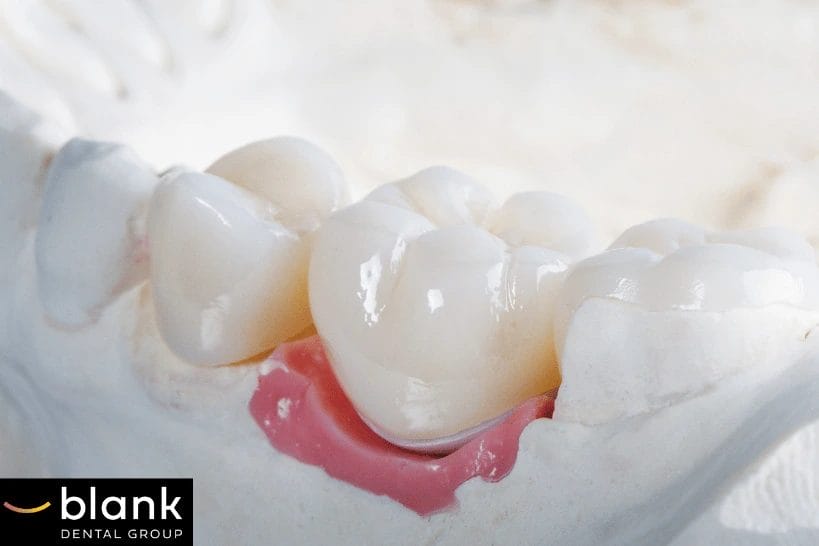Being told you need a dental crown isn’t exactly great news—but it’s also not something to panic about. In fact, getting a crown is one of the most common ways we help restore a tooth’s shape, strength, and function when damage, decay, or a root canal has left it compromised. Crowns can also be used with dental implants, and even for purely cosmetic improvements. Since there are several types of dental crowns and cost can vary widely, knowing your options ahead of time makes the process far less intimidating.
Still, we get it. Dental work can feel intimidating, especially if you’re not sure what your options are or how much it’s all going to cost. Whether you’re prepping for a crown or just doing a little research ahead of time, you’re in the right place. Let’s take a closer look, in plain language, at the different types of dental crowns available, how they compare, and what you can expect to pay.

What Is a Dental Crown, Really?
A dental crown is a custom-made “cap” that’s placed over a tooth. It covers the visible part of the tooth above the gum line and is cemented into place, becoming a permanent part of your smile. You still brush and floss it like a natural tooth. And if it’s done right—which, we promise, is always our goal—people won’t even notice it’s there.
But crowns aren’t only about appearances. More importantly, they protect teeth that are damaged or weakened. If you’ve had a large cavity, cracked your tooth, or recently had a root canal, a crown may be the best way to prevent future problems and restore your tooth’s full strength.
Do You Always Need a Crown After a Root Canal?
Not always—but often, yes. After a root canal, the tooth’s internal structure has been cleaned out and filled. While the infection is gone, the tooth itself is more fragile and prone to breaking. A crown helps reinforce it, keeping it strong enough to handle everyday biting and chewing. Especially on back teeth, where bite forces are stronger, a permanent crown can be an essential part of finishing root canal treatment.
What About Cost? Are Crowns Covered by Dental Insurance?
One of the first questions we hear from patients is about the cost. Understandably so. Getting a dental crown is an investment—but many times, dental insurance will cover part (and sometimes most) of the cost, especially when the crown is needed for restorative purposes rather than just cosmetic ones.
It’s a good idea to check your coverage in advance, and we’re more than happy to help you figure out the details with your insurance provider. The cost will ultimately depend on both your plan and the type of crown you and your dentist choose.

The Most Common Types of Dental Crowns (and How Much They Cost)
Here’s where we get into the specifics. While all crowns serve the same basic purpose, the materials they’re made from can affect everything from durability to cost to appearance.
Porcelain Crowns
Cost: $800 to $3,000 per tooth
If you’re repairing a front tooth and want it to blend in flawlessly, porcelain is likely your best bet. These crowns are color-matched to your natural teeth and offer a lifelike shine, making them nearly impossible to distinguish from your other teeth. They’re especially ideal when appearance is your priority.
Porcelain is quite stain-resistant—especially when glazed—but like anything in your mouth, its surface can wear over time if exposed to high acidity, rough brushing, or grinding.
Porcelain-Fused-to-Metal (PFM) Crowns
Cost: $500 to $1,500 per tooth
This type of crown offers the best of both worlds: the strength of a metal structure with the aesthetic appeal of a tooth-colored coating. It’s a popular choice for molars or teeth further back in your mouth because it can handle more bite force while still offering a natural look.
Just note, over time, you might see a small grey line at the gum line if your gums recede, so it’s not always the go-to for visible front teeth.
Metal Crowns
Cost: $600 to $2,500 per tooth
These are crafted from alloys like gold, nickel, or chromium. They don’t chip. They rarely ever break. And they last a long, long time. Metal crowns are ideal for molars in the very back, where their appearance isn’t likely to draw much attention.
Of course, they’re not tooth-colored, so if you’re smiling wide for a photo, they might stand out. But when strength is top priority, especially for patients who grind their teeth, metal is hard to beat.
Zirconia Crowns
Cost: $1,000 to $2,500 per tooth
Zirconia is one of the newer materials in dentistry, and frankly, it’s made a big splash—for good reason. These crowns are extremely strong (comparable to metal), biocompatible, and also quite attractive. They come in tooth-colored shades and can be either layered for aesthetics or left monolithic for strength.
In many ways, zirconia combines the best parts of metal and porcelain, making it a smart all-around option, especially when you want durability and a natural appearance.
Composite Resin Crowns
Cost: $300 to $1,000 per tooth
These are the most affordable crowns, and while they can be a temporary or more budget-conscious solution, they don’t last as long as other types. They’re more prone to wear, staining, and chipping, so they’re usually recommended for interim use or special circumstances, rather than as a long-term fix.
Choosing the Right Crown for You
The “best” crown isn’t always the most expensive one; it’s the one that fits your needs. We take into account where the crown is going in your mouth, your bite, any history of tooth grinding, what your dental insurance will cover, and of course, your preferences for look and feel.
Talking through the options with your dentist gives you a chance to weigh the pros and cons for your specific situation. Want the most natural-looking option? Porcelain might do the trick. Need something strong enough to handle years of chewing? Consider zirconia or metal.
It’s not about upselling. It’s about protecting your oral health while helping you make a choice you’re comfortable with.
Caring for Your Crown (It’s Easier Than You Think)
Once your crown is in place, it becomes part of your daily dental routine. You’ll brush and floss around it just like your natural teeth. Keeping your oral hygiene habits consistent—brushing twice a day, flossing daily, and seeing your dentist regularly—will help extend the life of your crown.
Crowns are durable, but not indestructible. Avoid cracking nuts or chewing ice with them. And if you have a habit of grinding your teeth at night, wearing a night guard is a smart move to protect both your crown and your natural teeth from damage.

Let’s Take the Next Step—Together
If you’ve been told you need a crown or suspect you may, you’re already taking the right step by learning more about your options. Dental care doesn’t have to feel overwhelming, and you don’t have to make these decisions alone.
We’re here to walk you through every option, answer any questions you might have about costs, dental insurance, or materials, and make sure you feel confident about how to move forward.
Your teeth work hard for you every day. When it’s time to restore their strength and function, choosing the right crown can bring real relief, and maybe even a little peace of mind. Schedule a visit, and let’s figure it out together.






